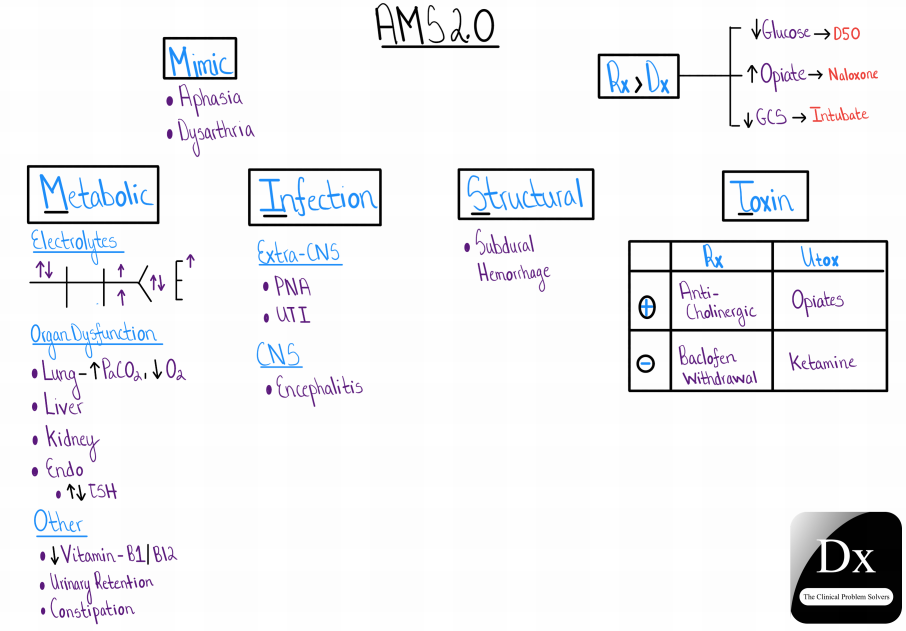


He was asked to help scan a patient with end stage liver disease being worked up and awaiting a liver transplant. This is a medical emergency which results in delirium and if not reversed, death ensues. This one comes from Ben Smith, on his CCM POCUS rotation. Symptoms of severe dehydration include dry mouth and lips, sunken eyes, increased mental status changes and decreased urine output. The emergency room plays a big role in the care of elderly patients with altered mental status. The majority of people are first evaluated in the emergency rooms.
serum chemzyme screen (glucose, renal/hepatic function tests)Ĭan dehydration cause altered mental status? Chronic mental status changes are due to disorders such as Alzheimer’s, dementia, or Parkinson’s. The essential diagnostic tests to differentiate among possible causes of altered mental status with their indications and contraindications including: Delirium is often a temporary change in brain function caused by a potentially reversible condition, such as an infection, hypoglycemia, medication side effects, etc.īeside above, how do you test for altered mental status? Although definition of AMS is so complicated, clinical documentation can be detected in. Different perception of AMS can cause negative impact on interpretation and obtaining scientific data. However there is a lack of standardization in the definition and documentation of this compliant. Likewise, what causes altered mental status with UTI? UTI, Dementia and Delirium in the Elderly In many cases, the only indicator that a senior has a UTI is an acute change in their mental status. Altered mental status (AMS) is common in older patients. Delirium may be associated with psychiatric, encephalopathic, or intracranial causes of altered mental status. Patients may even develop psychotic symptoms of hallucinations and delusions. Moreover, what are the signs and symptoms of altered mental status?Ĭharacteristics may include confusion, disorientation, agitation, inattention, and disorganized behavior. Patients with diabetes mellitus experiencing ketoacidosis or hypoglycemia have also been shown to experience delirium.An alteration in mental status refers to general changes in brain function, such as confusion, amnesia (memory loss), loss of alertness, disorientation (not cognizant of self, time, or place), defects in judgment or thought, unusual or strange behavior, poor regulation of emotions, and disruptions in perception, In this manner, can hyperglycemia cause delirium?Īcute hyperglycemia is known to alter mood state and impairs cognitive performance in patients with diabetes mellitus. Differentiating alterations in mental status resulting from metabolic alterations associated with DKA from altered mental status resulting from DKA-related cerebral edema can be difficult. Severely high levels of blood sugar may cause confusion or a coma.Īlso, what causes altered mental status in DKA? In addition, severe acidosis and/or severe hyperosmolality may cause depressed sensorium at the time of presentation of DKA. 1 AMS is a very common emergency case, but the exact etiology of many AMS patients is unknown. Altered Mental Status (AMS), can be described as a change in normal cognition (brain activity), and negatively affects an individual's ability to: Reason. Altered mental status with difficulty in breathing may indicate lack of oxygen to the brain. Late symptoms of prolonged, elevated blood sugar levels are blurred vision and possibly numbness in your fingers and toes. Altered mental status may accompany seizures or simply be the manifestation of a postictal state. Altered mental status (AMS) comprises a group of clinical symptoms rather than a specific diagnosis, and includes cognitive disorders, attention disorders, arousal disorders, and decreased level of consciousness. 
Symptoms of hyperglycemia are the same as symptoms of diabetes type 2. The key diagnostic feature in DKA is the elevation in circulating total blood ketone concentration.įurthermore, does hyperglycemia cause confusion?

Severe hyperglycemia and dehydration with altered mental status in the absence of significant acidosis characterize HHS, which clinically presents with less ketosis and greater hyperglycemia than DKA.








 0 kommentar(er)
0 kommentar(er)
